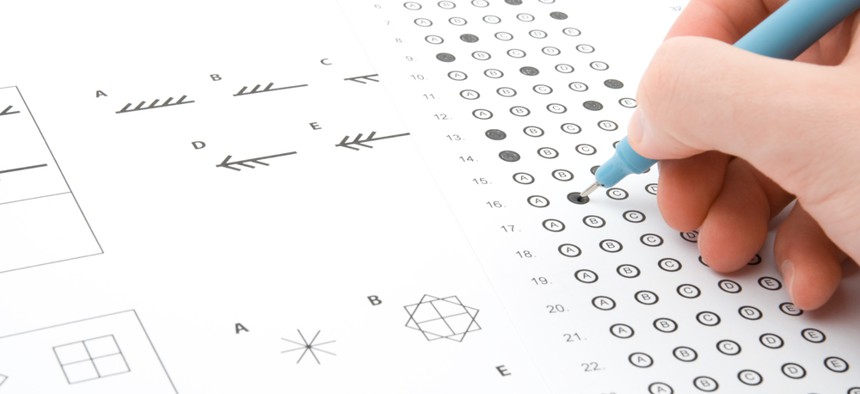
Jirsak/Shutterstock.com
When the Government Wanted a Database of Everyone's IQ
Today people worry about NSA spying. Fifty years ago it was intelligence tests. The conversation hasn't changed.
In November of 1967, The Atlantic's cover featured an evil Uncle Sam generating data readouts in a dark control room. The journalist behind the cover story, Arthur Miller, noted at the time that computer science was already so advanced "that experts envisage a huge National Data Center to speed and simplify the collection of pertinent information about Americans." Almost 50 years later U.S. law enforcement opened a secretive multi-billion dollar, million-square-foot data center in the mountains of Utah.
In the piece, Miller also worried about the potential abuse and, more importantly, the mistakes of surveillance:
As a result, someone who simply exchanges Christmas cards with a person whose mail is being monitored might find himself under surveillance or might be turned down when he applies for a job with the government or requests a government grant or applies for some other governmental benefit. An untested, impersonal, and erroneous computer entry such as 'associates with known criminals' has marked him, and he is helpless to rectify the situation. Indeed, it is likely that he would not even be aware that the entry existed.
Sounds somewhat familiar, eh? The debate over privacy has cracked the mainstream spotlight once again in recent years with Edward Snowden's leaks about the extent of law enforcement surveillance and companies like Facebook and Google using the world's most advanced computers to learn about people in order to deliver advertisements. But the concerns about quantitative interpretations of people have been around for a long time. In the 1960’s, people weren’t worried about vast internet spying, of course—instead, they were worried about IQ tests.
In 1968, the United States formed the House Subcommittee on Invasion of Privacy, which, according to the AP investigated, "data-gathering organizations and the dangers of unauthorized access to potentially damaging information." Much of the committee's formation was sparked by complaints of government agencies using certain psychological and personality tests during the hiring process. Opponents said gathering things like IQ tests and psychological fitness exams was an invasion of privacy.
Psychologists and experts still debate how much useful information can be gathered from these tests, but authors of The Assessment of Child and Adolescent Personality note that, at the time, "the basic issues involved the nature of undue invasion of privacy and the use of tests in situations for which they were not validated."
Ultimately this committee, along with another in the Senate, found no wrongdoing in the case of storing psychological tests. But it soon began hearing other complaints about security and privacy.
"Anything can be fed into the computers," Benjamin S. Rosenthal, a house representative from New York, said to the committee in 1968 with regards to computers storing information about people's credit history. "It can be fed erroneous information as well as it can be fed correct information. Within minutes, this false information can be disseminated to thousands of businesses, and can be very harmful to the individuals." Rosenthal went on to say computerized dossiers are being stored at the rate of 50,000 per week.
This "is just frightening to me," he said. Again, sound familiar?
Today we hear the same worries over surveillance tactics. Last year Senator Dianne Feinstein wrote that collecting US citizen's metadata like timestamp and duration of phone calls is necessary for law enforcement to "connect the dots" on criminals and doesn't violate the fourth amendment. Later, the ACLU of California provided a report showing that collecting "just metadata" painted a far more complete picture of people's lives than law enforcement lets on.
Defining "privacy" has always been a challenge. A practical and working definition in today's digital world has proven hard for even for experts. In 1967 the Office of Science and Technology took a shot with "the right of an individual to decide for him/herself how much he will share with others his thoughts, feelings and facts of personal life"—a right considered "essential to insure dignity and freedom of self determination." But that whether people are actually "deciding"—check your Facebook settings—and the "how much" part has always been the battleground. Any time we draw a line for what information we share about ourselves we open another set of implications.
That ends up being one of the key back and forth of the debate, both then and now: The party with the quantitative tools, whether they're tests or computers says, "We only want to know X." In response, watchdogs point out, "Yes, but that also allows you to know Y."
In 1969 psychologist W.G. Dahlstrom argued that the issue of invasion of privacy regarding IQ tests was based on misunderstanding, and that the public didn't actually realize the limitations of psychological testing—the extent of their useful information had been oversold to the public. He also took issue with, in his eyes, the murky nature of what constituted an invasion of privacy. In the words ofPsychological Testing, Dahlstrom made a now-familiar argument: It is not "necessarily wrong, evil or detrimental to find out about a person. The person's privacy is invaded when such information is used inappropriately."
So the public ends up caught in the position of having to decide whether it trusts organizations and governments with opaque decision-making processes and access to their intimate data. Yesterday it was IQ tests, today it’s our phone calls and metadata, tomorrow it might be our biological data. We’ve worried about this for over fifty years, and we still haven’t figure out what to do about it.
(Image via Jirsak/Shutterstock.com)
NEXT STORY: 5 Things to Know About Phased Retirement






